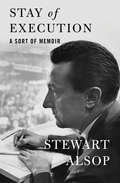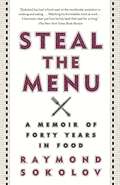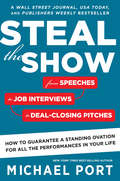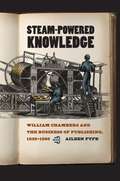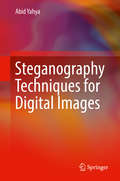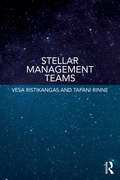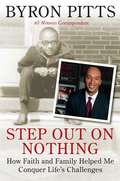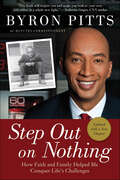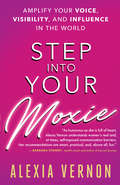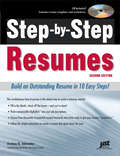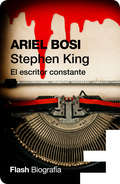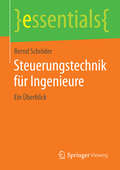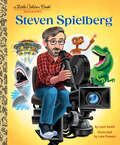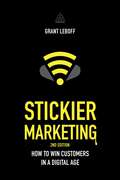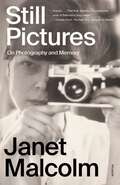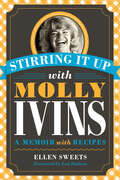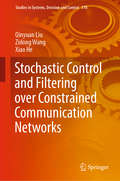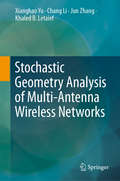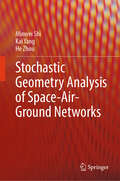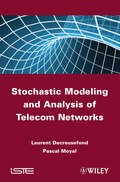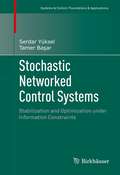- Table View
- List View
Stay of Execution: A Sort of Memoir
by Stewart AlsopA poignant memoir of a full life and an impending death, written by one of America&’s foremost journalists during his battle with terminal cancer. For three decades, from the end of World War II well into the Watergate era, internationally renowned newspaper and magazine columnist Stewart Alsop was a fixture on the Washington, DC, political landscape. In 1971, the respected journalist was diagnosed with a rare form of leukemia, marking the beginning of his courageous three-year battle with the terrible cancer that ravaged his body but could not damage his spirit or slow his facile and brilliantly incisive mind. A passionate social critic and peerless political analyst who hobnobbed with presidents from FDR to Nixon, and enjoyed the respectful fellowship of such notable figures as Winston Churchill, Alice Roosevelt Longworth, and Henry Kissinger, Alsop insightfully chronicles the course of his medical history without a trace of maudlin self-pity while celebrating his family, friends, colleagues, and an extraordinary life well lived. Stay of Execution is Stewart Alsop&’s moving, powerful, and inspiring memoir of his terminal illness and his life before—an unforgettable true story of courage and accomplishment, trials and tragedy from one of the most revered American journalists of the twentieth century.
Steal the Menu: A Memoir of Forty Years in Food
by Raymond SokolovFour decades of memories from a gastronome who witnessed the food revolution from the (well-provisioned) trenches--a delicious tour through contemporary food history. When Raymond Sokolov became food editor of The New York Times in 1971, he began a long, memorable career as restaurant critic, food historian, and author. Here he traces the food scene he reported on in America and abroad, from his pathbreaking dispatches on nouvelle cuisine chefs like Paul Bocuse and Michel Guérard in France to the rise of contemporary American food stars like Thomas Keller and Grant Achatz, and the fruitful collision of science and cooking in the kitchens of El Bulli in Spain, the Fat Duck outside London, and Copenhagen's gnarly Noma. Sokolov invites readers to join him as a privileged observer of the most transformative period in the history of cuisine with this personal narrative of the sensual education of an accidental gourmet. We dine out with him at temples of haute cuisine like New York's Lutèce but also at a pioneering outpost of Sichuan food in a gas station in New Jersey, at a raunchy Texas chili cookoff, and at a backwoods barbecue shack in Alabama, as well as at three-star restaurants from Paris to Las Vegas. Steal the Menu is, above all, an entertaining and engaging account of a tumultuous period of globalizing food ideas and frontier-crossing ingredients that produced the unprecedentedly rich and diverse way of eating we enjoy today.
Steal the Show
by Michael PortAn inspiring program full of essential advice for spotlight lovers and wallflowers alike that will teach readers how to bring any crowd to its feet Every day there are moments when you must persuade, inform, and motivate others effectively. Each of those moments requires you, in some way, to play a role, to heighten the impact of your words, and to manage your emotions and nerves. Every interaction is a performance, whether you're speaking up in a meeting, pitching a client, or walking into a job interview. In Steal the Show, New York Times best-selling author Michael Port draws on his experience as an actor and as a highly successful corporate speaker and trainer to teach readers how to make the most of every presentation and interaction. He demonstrates how the methods of successful actors can help you connect with, inspire, and persuade any audience. His key strategies for commanding an audience's attention include developing a clear focus for every performance, making sure you engage with your listeners, and finding the best role for yourself in order to convey your message with maximum impact. Michael Port is one of the most in-demand corporate speakers working today. His presentations are always powerful, engaging, and inspirational. And yes, audiences always give him a standing ovation.
Stealing Time: Steve Case, Jerry Levin, and the Collapse of AOL
by Alec KleinWhy the concept failed.Why the concept failed.
Steam-Powered Knowledge: William Chambers and the business of publishing, 1820-1860
by Aileen FyfeWith the overwhelming amount of new information that bombards us each day, it is perhaps difficult to imagine a time when the widespread availability of the printed word was a novelty. In early nineteenth-century Britain, print was not novel—Gutenberg’s printing press had been around for nearly four centuries—but printed matter was still a rare and relatively expensive luxury. All this changed, however, as publishers began employing new technologies to astounding effect, mass-producing instructive and educational books and magazines and revolutionizing how knowledge was disseminated to the general public. In Steam-Powered Knowledge, Aileen Fyfe explores the activities of William Chambers and the W. & R. Chambers publishing firm during its formative years, documenting for the first time how new technologies were integrated into existing business systems. Chambers was one of the first publishers to abandon traditional skills associated with hand printing, instead favoring the latest innovations in printing processes and machinery: machine-made paper, stereotyping, and, especially, printing machines driven by steam power. The mid-nineteenth century also witnessed dramatic advances in transportation, and Chambers used proliferating railway networks and steamship routes to speed up communication and distribution. As a result, his high-tech publishing firm became an exemplar of commercial success by 1850 and outlived all of its rivals in the business of cheap instructive print. Fyfe follows Chambers’s journey from small-time bookseller and self-trained hand-press printer to wealthy and successful publisher of popular educational books on both sides of the Atlantic, demonstrating along the way the profound effects of his and his fellow publishers’ willingness, or unwillingness, to incorporate these technological innovations into their businesses.
Steganography Techniques for Digital Images
by Abid YahyaThis book covers newly developed and novel Steganography techniques and algorithms. The book outlines techniques to provide security to a variety of applications using Steganography, with the goal of both hindering an adversary from decoding a hidden message, and also preventing an adversary from suspecting the existence of covert communications. The book looks into applying these newly designed and improved algorithms to provide a new and efficient Steganographic system, called Characteristic Region-Based Image Steganography (CR-BIS). The algorithms combine both the robustness of the Speeded-Up Robust Features technique (SURF) and Discrete Wavelet Transform (DWT) to achieve characteristic region Steganography synchronization. The book also touches on how to avoid hiding data in the whole image by dynamically selecting characteristic regions for the process of embedding. Applies and discusses innovative techniques for hiding text in a digital image file or even using it as a key to the encryption;Provides a variety of methods to achieve characteristic region Steganography synchronization;Shows how Steganography improves upon cryptography by using obscurity features.
Steganography in Digital Media
by Jessica FridrichSteganography, the art of hiding of information in apparently innocuous objects or images, is a field with a rich heritage, and an area of rapid current development. This clear, self-contained guide shows you how to understand the building blocks of covert communication in digital media files and how to apply the techniques in practice, including those of steganalysis, the detection of steganography. Assuming only a basic knowledge in calculus and statistics, the book blends the various strands of steganography, including information theory, coding, signal estimation and detection, and statistical signal processing. Experiments on real media files demonstrate the performance of the techniques in real life, and most techniques are supplied with pseudo-code, making it easy to implement the algorithms. The book is ideal for students taking courses on steganography and information hiding, and is also a useful reference for engineers and practitioners working in media security and information assurance.
Stellar Management Teams
by Vesa Ristikangas Tapani RinneManagement teams at all levels, and individual team members in particular, are often disengaged and disconnected from the management function itself. Statements such as, "we lack common goals or they are unclear", "I have no influence", "I am not listened to nor taken into account", and "I do not feel valued – actually, nobody does", are commonplace. The authors argue this is because we have been entrenched in an era of guru leadership but that it must come to an end if our management teams are to rise to the top. An individual is not capable of controlling the complicated system of an organization, with its countless variables, especially in conjunction with the rapid change in both the economy and market forces, which are unpredictable and uncontrollable. No matter how talented the individual, no one person is in a position to manage this complex system alone – not even a guru leader. The authors contend that what is needed now are resilient trendsetters who will bring about a new era of top-performing teams that together form a "collective guru", which they refer to as a Stellar Management Team. In this book, the reader undertakes a metaphorical journey to the stars, which symbolizes top-level interaction and collaboration. The journey is the development from an ordinary management team into a Stellar Management Team, which elevates its operation up to a new level of performance and success.
Step Out on Nothing: How Faith and Family Helped Me Conquer Life's Challenges
by Byron PittsIt was August 25, 2006, my first on-camera studio open for the CBS News broadcast 60 Minutes. Executive Producer Jeff Fager poked his head in the dressing room. "Good luck, Brotha! You've come a long way to get here. You've earned it." If only he knew. My mind flashed back to elementary school, when a therapist had informed my mother, "I'm sorry, Mrs. Pitts, your son cannot read. " In Step Out on Nothing, Byron Pitts chronicles his astonishing story of overcoming a childhood filled with obstacles to achieve enormous success in life. Throughout Byron's difficult youth - his parents separated when he was twelve and his mother worked two jobs to make ends meet - he suffered from a debilitating stutter. But Byron was keeping an even more embarrassing secret: He was also functionally illiterate. For a kid from inner-city Baltimore, it was a recipe for failure. Pitts turned struggle into strength and overcame both of his impediments. Along the way, a few key people "stepped out on nothing" to make a difference for him - from his mother, who worked tirelessly to raise her kids right and delivered ample amounts of tough love, to his college roommate, who helped Byron practice his vocabulary and speech. Pitts even learns from those who didn't believe in him, like the college professor who labeled him a failure and told him to drop out of college. Through it all, he persevered, following his steadfast passion. After fifteen years in local television, he landed a job as a correspondent for CBS News in 1998, and went on to become an Emmy Award - winning journalist and a contributing correspondent for 60 Minutes. Not bad for a kid who couldn't read. From a challenged youth to a reporting career that has covered 9/11 and Iraq, Pitts's triumphant and uplifting story will resonate with anyone who has felt like giving up in the face of seemingly insurmountable hardships.
Step Out on Nothing: How Faith and Family Helped Me Conquer Life's Challenges
by Byron PittsIt was August 25, 2006, my first on-camera studio open for the CBS News broadcast 60 Minutes. Executive Producer Jeff Fager poked his head in the dressing room." Good luck, Brotha! You've come a long way to get here. You've earned it."…If only he knew. My mind flashed back to elementary school, when a therapist had informed my mother, "I'm sorry, Mrs. Pitts, your son cannot read."In Step Out on Nothing, Byron Pitts chronicles his astonishing story of overcoming a childhood filled with obstacles to achieve enormous success in life. Throughout Byron's difficult youth—his parents separated when he was twelve and his mother worked two jobs to make ends meet—he suffered from a debilitating stutter. But Byron was keeping an even more embarrassing secret: He was also functionally illiterate. For a kid from inner-city Baltimore, it was a recipe for failure.Pitts turned struggle into strength and overcame both of his impediments. Along the way, a few key people "stepped out on nothing" to make a difference for him—from his mother, who worked tirelessly to raise her kids right and delivered ample amounts of tough love, to his college roommate, who helped Byron practice his vocabulary and speech. Pitts even learns from those who didn't believe in him, like the college professor who labeled him a failure and told him to drop out of college. Through it all, he persevered, following his steadfast passion. After fifteen years in local television, he landed a job as a correspondent for CBS News in 1998, and went on to become an Emmy Award–winning journalist and a contributing correspondent for 60 Minutes. Not bad for a kid who couldn't read.From a challenged youth to a reporting career that has covered 9/11 and Iraq, Pitts's triumphant and uplifting story will resonate with anyone who has felt like giving up in the face of seemingly insurmountable hardships.
Step into Your Moxie: Amplify Your Voice, Visibility, and Influence in the World
by Alexia VernonPREPARE TO TRANSFORM YOUR VOICE AND BE HEARD Step into Your Moxie is a soul-stirring call to action to speak up for yourself and the ideas and issues that matter most to you. Dubbed a “Moxie Maven” by President Obama’s White House Office of Public Engagement for her potent approach to women’s empowerment, Alexia Vernon has helped thousands of women (and men) slay diminishing self-talk and cultivate confidence. She has created a timely, refreshingly playful guide for women to communicate with candor, clarity, compassion, and ease every time they open their mouths to speak — in their careers, communities, and homes. Step into Your Moxie is the book women want by their side as they have that daring conversation, give an important presentation, run for office, or simply tell the people closest to them to step back from the boundaries they’ve trespassed.
Step-by-Step Resumes
by Evelyn U SalvadorAn extensive collection of thousands of powerful resume keywords to help readers' resumes stand out in electronic databases.
Stephen King: El escritor constante
by Ariel BosiUna interesante introducción a la vida y obra del maestro del horror. De la mano de Ariel Bosi, uno de los mayores expertos en la vida y obra del Rey de Reyes, conocerás los inicios como escritor de Stephen King, sus muchos fracasos, sus penurias económicas y sus principales logros como autor; los cimientos que le convirtieron en el más importante escritor vivo de literatura de terror. «Hora soy escritor. Muchísimos críticos creen que lo que escribo es una mierda [...] Mi historia se parece tantísimo a un cuento de hadas que resulta absurda.»Stephen King, El cuerpo
Steuerungstechnik für Ingenieure: Ein Überblick (essentials)
by Bernd SchröderFür selbstarbeitende und automatisierte (Produktions-) Prozesse werden Steuerungstechniken genutzt. Die hierzu eingesetzten Elemente arbeiten mechanisch, pneumatisch, hydraulisch, elektrisch oder elektronisch. Ausführende Organe sind unter anderem Ventile, Pumpen, Motore, Schalter, Sensoren und Relais. Die hierfür gängigen Symbole werden vorgestellt und können in Schemata eingesetzt werden. Gelegentlich ist die Erstellung sequenzieller Schaltungen hilfreich. Für eine hohe Flexibilität bietet sich die speicherprogrammierbare Steuerung (SPS) an.
Steven Spielberg: A Little Golden Book Biography (Little Golden Book)
by Geof SmithDream big with a Little Golden Book biography about Hollywood's most famous director Steven Spielberg. It's the perfect introduction to nonfiction for young readers—as well as fans of all ages!This Little Golden Book about Steven Spielberg—the Academy Award-winning director of iconic films such as Jaws, E.T. The Extra-Terrestrial, Jurassic Park, Schindler's List, and the Indiana Jones original film trilogy—is an inspiring read-aloud for young children and fans of any age.Look for more Little Golden Book biographies:Betty WhiteDwanye JohnsonOprah WinfreyCarol BurnettJulie Andrews
Stickier Marketing
by Grant LeboffIn Sticky Marketing Grant Leboff argued that the old marketing system of shouting messages at people was finished, replaced by providing value around your product or service: brands needed to become sticky. This new edition of Sticky Marketing, Stickier Marketing, remains a complete guide to producing effective marketing communications in a world of consumers empowered by new digital technology who do not want to be shouted at but engaged with. It shows readers how providing return on engagement, rather than return on investment, and a customer engagement point, rather than a unique selling point, is what will make the difference in today's cluttered marketing place. Updated throughout, this new edition also includes brand new chapters on content marketing, discovery and mobile marketing.
Stickier Marketing: How to Win Customers in a Digital Age
by Grant LeboffIn Sticky Marketing Grant Leboff argued that the old marketing system of shouting messages at people was finished, replaced by providing value around your product or service: brands needed to become sticky. This new edition of Sticky Marketing, Stickier Marketing, remains a complete guide to producing effective marketing communications in a world of consumers empowered by new digital technology who do not want to be shouted at but engaged with. It shows readers how providing return on engagement, rather than return on investment, and a customer engagement point, rather than a unique selling point, is what will make the difference in today's cluttered marketing place. Updated throughout, this new edition also includes brand new chapters on content marketing, discovery and mobile marketing.
Still Pictures: On Photography and Memory
by Janet Malcolm“Superb . . . [The] final, splendid, most personal work of [Janet Malcolm’s] long career.” —Charles Finch, The New York Times Book ReviewFor decades, Janet Malcolm’s books and dispatches for The New Yorker and The New York Review of Books poked and prodded at reportorial and biographical convention, gesturing toward the artifice that underpins both public and private selves. In Still Pictures, she turns her gimlet eye on her own life—a task demanding a writer just as peerlessly skillful as she was widely known to be.Still Pictures, then, is not the story of a life but an event on its own terms, an encounter with identity and family photographs as poignant and original as anything since Roland Barthes’s Camera Lucida. Malcolm looks beyond the content of the image and the easy seductions of self-recognition, constructing a memoir from memories that pose questions of their own. Still Pictures begins with the image of a morose young girl on a train, leaving Prague for New York at the age of five in 1939. From her fitful early loves, to evenings at the old Metropolitan Opera House, to her fascination with what it might mean to be a “bad girl,” Malcolm assembles a composite portrait of a New York childhood, one that never escapes the tug of Europe and the mysteries of fate and family. Later, Still Pictures delves into her marriage to Gardner Botsford, the world of William Shawn’s New Yorker, and the libel trial that led Malcolm to become a character in her own drama. Displaying the sharp wit and astute commentary that are Malcolmian trademarks, this brief volume develops into a memoir like few others in our literature.
Stirring It Up with Molly Ivins: A Memoir with Recipes
by Ellen SweetsYou probably knew Molly Ivins as an unabashed civil libertarian who used her rapier wit and good ole Texas horse sense to excoriate political figures she deemed unworthy of our trust and respect. But did you also know that Molly was one helluva cook? And we’re not just talking chili and chicken-fried steak, either. Molly Ivins honed her culinary skills on visits to France—often returning with perfected techniques for saumon en papillote or delectable clafouti aux cerises. Friends who had the privilege of sharing Molly’s table got not only a heaping helping of her insights into the political shenanigans of the day, but also a mouth-watering meal, prepared from scratch with the finest ingredients and assembled with the same meticulous attention to detail that Molly devoted to skewering a political recalcitrant. In Stirring It Up with Molly Ivins, her longtime friend, fellow reporter, and frequent sous-chef Ellen Sweets takes us into the kitchen with Molly and introduces us to the private woman behind the public figure. She serves up her own and others’ favorite stories about Ivins as she recalls the fabulous meals they shared, complete with recipes for thirty-five of Molly’s signature dishes. These stories reveal a woman who was even more fascinating and complex than the “professional Texan” she enjoyed playing in public. Friends who ate with Molly knew a cultured woman who was a fluent French speaker, voracious reader, rugged outdoors aficionado, music lover, loyal and loving friend, and surrogate mom to many of her friends’ children, as well as to her super-spoiled poodle. They also came to revere the courageous woman who refused to let cancer stop her from doing what she wanted, when she wanted. This is the Molly you’ll be delighted to meet in Stirring It Up with Molly Ivins.
Stochastic Control and Filtering over Constrained Communication Networks (Studies in Systems, Decision and Control #178)
by Zidong Wang Qinyuan Liu Xiao HeStochastic Control and Filtering over Constrained Communication Networks presents up-to-date research developments and novel methodologies on stochastic control and filtering for networked systems under constrained communication networks. It provides a framework of optimal controller/filter design, resilient filter design, stability and performance analysis for the systems considered, subject to various kinds of communication constraints, including signal-to-noise constraints, bandwidth constraints, and packet drops. Several techniques are employed to develop the controllers and filters desired, including:recursive Riccati equations;matrix decomposition;optimal estimation theory; andmathematical optimization methods.Readers will benefit from the book’s new concepts, models and methodologies that have practical significance in control engineering and signal processing. Stochastic Control and Filtering over Constrained Communication Networks is a practical research reference for engineers dealing with networked control and filtering problems. It is also of interest to academics and students working in control and communication networks.
Stochastic Geometry Analysis of Multi-Antenna Wireless Networks
by Jun Zhang Xianghao Yu Chang Li Khaled B. LetaiefThis book presents a unified framework for the tractable analysis of large-scale, multi-antenna wireless networks using stochastic geometry. This mathematical analysis is essential for assessing and understanding the performance of complicated multi-antenna networks, which are one of the foundations of 5G and beyond networks to meet the ever-increasing demands for network capacity. Describing the salient properties of the framework, which makes the analysis of multi-antenna networks comparable to that of their single-antenna counterparts, the book discusses effective design approaches that do not require complex system-level simulations. It also includes various application examples with different multi-antenna network models to illustrate the framework’s effectiveness.
Stochastic Geometry Analysis of Space-Air-Ground Networks
by Kai Yang Minwei Shi He ZhouThis book presents a comprehensive framework for the theoretical analysis of space-air-ground networks using stochastic geometry. This analytical approach is indispensable for evaluating the performance of large-scale space-air-ground networks, which serve as critical facilitators for the advancement of the sixth-generation wireless communication aimed at providing high-speed broadband coverage for remote areas. By incorporating the features of topology and channel model in different tiers, this book investigates the key performance metrics in terms of load balancing, coverage assessment, and mobility management. The developed mechanisms provide effective design insights for space-air-ground networks while obviating the need for complex system-level simulations.
Stochastic Modeling and Analysis of Telecom Networks
by Pascal Moyal Laurent DecreusefondThis book addresses the stochastic modeling of telecommunication networks, introducing the main mathematical tools for that purpose, such as Markov processes, real and spatial point processes and stochastic recursions, and presenting a wide list of results on stability, performances and comparison of systems. The authors propose a comprehensive mathematical construction of the foundations of stochastic network theory: Markov chains, continuous time Markov chains are extensively studied using an original martingale-based approach. A complete presentation of stochastic recursions from an ergodic theoretical perspective is also provided, as well as spatial point processes. Using these basic tools, stability criteria, performance measures and comparison principles are obtained for a wide class of models, from the canonical M/M/1 and G/G/1 queues to more sophisticated systems, including the current “hot topics” of spatial radio networking, OFDMA and real-time networks. Contents 1. Introduction. Part 1: Discrete-time Modeling 2. Stochastic Recursive Sequences. 3. Markov Chains. 4. Stationary Queues. 5. The M/GI/1 Queue. Part 2: Continuous-time Modeling 6. Poisson Process. 7. Markov Process. 8. Systems with Delay. 9. Loss Systems. Part 3: Spatial Modeling 10. Spatial Point Processes.
Stochastic Networked Control Systems
by Tamer Başar Serdar YükselNetworked control systems are increasingly ubiquitous today, with applications ranging from vehicle communication and adaptive power grids to space exploration and economics. The optimal design of such systems presents major challenges, requiring tools from various disciplines within applied mathematics such as decentralized control, stochastic control, information theory, and quantization. A thorough, self-contained book, Stochastic Networked Control Systems: Stabilization and Optimization under Information Constraints aims to connect these diverse disciplines with precision and rigor, while conveying design guidelines to controller architects. Unique in the literature, it lays a comprehensive theoretical foundation for the study of networked control systems, and introduces an array of concrete tools for work in the field. Salient features included: · Characterization, comparison and optimal design of information structures in static and dynamic teams. Operational, structural and topological properties of information structures in optimal decision making, with a systematic program for generating optimal encoding and control policies. The notion of signaling, and its utilization in stabilization and optimization of decentralized control systems. · Presentation of mathematical methods for stochastic stability of networked control systems using random-time, state-dependent drift conditions and martingale methods. · Characterization and study of information channels leading to various forms of stochastic stability such as stationarity, ergodicity, and quadratic stability; and connections with information and quantization theories. Analysis of various classes of centralized and decentralized control systems. · Jointly optimal design of encoding and control policies over various information channels and under general optimization criteria, including a detailed coverage of linear-quadratic-Gaussian models. · Decentralized agreement and dynamic optimization under information constraints. This monograph is geared toward a broad audience of academic and industrial researchers interested in control theory, information theory, optimization, economics, and applied mathematics. It could likewise serve as a supplemental graduate text. The reader is expected to have some familiarity with linear systems, stochastic processes, and Markov chains, but the necessary background can also be acquired in part through the four appendices included at the end. · Characterization, comparison and optimal design of information structures in static and dynamic teams. Operational, structural and topological properties of information structures in optimal decision making, with a systematic program for generating optimal encoding and control policies. The notion of signaling, and its utilization in stabilization and optimization of decentralized control systems. · Presentation of mathematical methods for stochastic stability of networked control systems using random-time, state-dependent drift conditions and martingale methods. · Characterization and study of information channels leading to various forms of stochastic stability such as stationarity, ergodicity, and quadratic stability; and connections with information and quantization theories. Analysis of various classes of centralized and decentralized control systems. · Jointly optimal design of encoding and control policies over various information channels and under general optimization criteria, including a detailed coverage of linear-quadratic-Gaussian models. · Decentralized agreement and dynamic optimization under information constraints. This monograph is geared toward a broad audience of academic and industrial researchers interested in control theory, information theory, optimization, economics, and applied mathematics. It could likewise serve as a supplemental graduate text. The reader is expected to have some familiarity with linear systems, stochastic processes, and Markov chai...
Stochastic Networks
by Frank Kelly Elena YudovinaIn the past decade the proliferation of local and global communication networks for computer and human communication, the development of parallel computers with large numbers of processors, and the design of flexible and robust manufacturing systems have spurred major advances in our understanding of queuing volume reviews recent progress. While research on queuing networks uses many of the traditional queuing theory insights, it is more concerned with how network components interact than with detailed models of how an individual queue behaves. In the last few years there have been some surprises, in particular with regard to the conditions for stability of multiclass queuing networks, which is covered in this book. It also covers the challenges reflected Brownian motion has set both as a mathematical object and as a modelling paradigm; the usefulness of ideas from the interacting particle system world; the application of large deviation theory; and the developing connections with optimization and dynamical systems theory.
